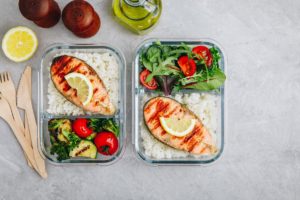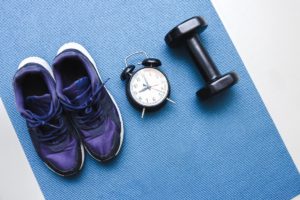Latest Articles

How Many Meals For Weight Loss?
Meal Frequency Does Not Effect Fat Loss An old but popular myth says eating many small meals will boost your metabolism. Newer beliefs are countering this myth by saying intermittent fasting is the way to go; eating only once or twice during a dedicated time called the “eating window.” In reality, both of these statements are false. How many meals you eat every day does not directly effect fat loss. The only way any diet can create fat loss is by creating a calorie deficit. Calorie Deficit: The Only Way to Lose Fat A calorie deficit simply means burning more

What Exercise Uses the Most Muscles
Using more muscles per exercise means a more efficient workout. Why waste time on 10 individual muscles when you can hit all 10 during a single exercise? Although working one muscle at a time has it’s place, most gym goers would benefit from working multiple at once. Not only does it save time, but it also enhances the results of each workout. So, which one’s work the most muscles at the same time? The squat, bench, and deadlift use the most muscles out of all exercises. They’re compound movements that use both free weights and muscle synergy. In other words,

How Much Time You Should Spend At the Gym
You only need to spend between 30 to 60 minutes on a workout. More advanced gym goers can surpass 60 minutes, but only if they’re not overtraining. More importantly How Many Exercises per Workout How many exercises you do during your workout depends on two things; your rest periods and how many sets/reps you use. Both of these factors depend on your experience level and workout goals. Here’s a table of each goal along with how many reps and sets to use, how long to rest, and how many exercises should be in the workout. Workout Goal Sets Reps Rest

Should You Eat the Same or Different Calories Everyday?
Eating the same calories daily is great for building a habit, but planning high and low calorie days is a great step up. Eating different calories each day helps break weight loss plateaus, energize your workouts, and creates a more flexible lifestyle. Just follow the steps below to find out how to effectively create different calorie goals for weight loss or muscle gain. If you have trouble consistently tracking your food every day, it’s better to start with eating the same calories every day. Eating different calories provides great results, but is more difficult to learn. However, if you’ve been

3 Ways to Maintain Your Weight Without Counting Calories
Counting calories can be an easy and reliable way to lose weight. As long as you’re eating within your calorie “budget,” you can eat a variety of foods while still making progress. However, calorie counting should only be a temporary practice. Those who continue counting just to maintain their weight can develop unhealthy mindsets and behaviors like orthorexia, the obsession of always needing healthy foods. To live a balanced lifestyle, you need to eventually stop tracking and eat intuitively. So how can you eat intuitively without gaining all the weight back? Creating a mental “calorie index,” focusing on whole foods,

Hunger After Strength Training – A Great Sign of Fat Burning
Why You Feel Hungry After Weightlifting The main reason you feel hungry is because of the calorie burn both during and after the workout. Of course, you burn a lot of calories during your workout since you’re moving, engaging your muscles, and getting your heartrate up. On top of this, you use quite a bit just to repair your body after the workout. How Recovery Burns Calories All exercise works by breaking down tissue, especially muscle tissue. Repairing this tissue is very “calorie expensive” because the body has to gather the materials from the digestive system, send them to the

How Many Meals For Weight Loss?
Meal Frequency Does Not Effect Fat Loss An old but popular myth says eating many small meals will boost your metabolism. Newer beliefs are countering this myth by saying intermittent fasting is the way to go; eating only once or twice during a dedicated time called the “eating window.” In reality, both of these statements are false. How many meals you eat every day does not directly effect fat loss. The only way any diet can create fat loss is by creating a calorie deficit. Calorie Deficit: The Only Way to Lose Fat A calorie deficit simply means burning more

What Exercise Uses the Most Muscles
Using more muscles per exercise means a more efficient workout. Why waste time on 10 individual muscles when you can hit all 10 during a single exercise? Although working one muscle at a time has it’s place, most gym goers would benefit from working multiple at once. Not only does it save time, but it also enhances the results of each workout. So, which one’s work the most muscles at the same time? The squat, bench, and deadlift use the most muscles out of all exercises. They’re compound movements that use both free weights and muscle synergy. In other words,

How Much Time You Should Spend At the Gym
You only need to spend between 30 to 60 minutes on a workout. More advanced gym goers can surpass 60 minutes, but only if they’re not overtraining. More importantly How Many Exercises per Workout How many exercises you do during your workout depends on two things; your rest periods and how many sets/reps you use. Both of these factors depend on your experience level and workout goals. Here’s a table of each goal along with how many reps and sets to use, how long to rest, and how many exercises should be in the workout. Workout Goal Sets Reps Rest

Should You Eat the Same or Different Calories Everyday?
Eating the same calories daily is great for building a habit, but planning high and low calorie days is a great step up. Eating different calories each day helps break weight loss plateaus, energize your workouts, and creates a more flexible lifestyle. Just follow the steps below to find out how to effectively create different calorie goals for weight loss or muscle gain. If you have trouble consistently tracking your food every day, it’s better to start with eating the same calories every day. Eating different calories provides great results, but is more difficult to learn. However, if you’ve been

3 Ways to Maintain Your Weight Without Counting Calories
Counting calories can be an easy and reliable way to lose weight. As long as you’re eating within your calorie “budget,” you can eat a variety of foods while still making progress. However, calorie counting should only be a temporary practice. Those who continue counting just to maintain their weight can develop unhealthy mindsets and behaviors like orthorexia, the obsession of always needing healthy foods. To live a balanced lifestyle, you need to eventually stop tracking and eat intuitively. So how can you eat intuitively without gaining all the weight back? Creating a mental “calorie index,” focusing on whole foods,

Hunger After Strength Training – A Great Sign of Fat Burning
Why You Feel Hungry After Weightlifting The main reason you feel hungry is because of the calorie burn both during and after the workout. Of course, you burn a lot of calories during your workout since you’re moving, engaging your muscles, and getting your heartrate up. On top of this, you use quite a bit just to repair your body after the workout. How Recovery Burns Calories All exercise works by breaking down tissue, especially muscle tissue. Repairing this tissue is very “calorie expensive” because the body has to gather the materials from the digestive system, send them to the